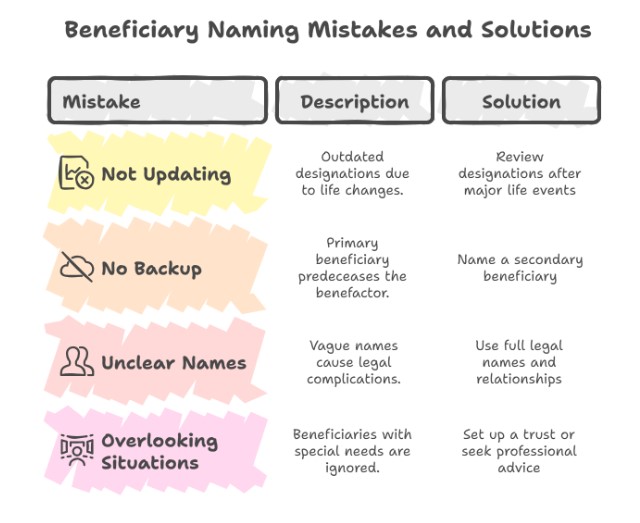

Originally published: July 2025 | Reviewed by Mary Conte
Choosing your beneficiary in Central Florida requires understanding Florida’s unique laws, including homestead exemptions, elective share rights, and beneficiary designation precedence over wills.
The right beneficiary selection protects assets, minimizes taxes, and ensures smooth transfers while complying with the probate procedures of Seminole, Orange, and Volusia counties.
Selecting a beneficiary ensures that assets go directly to the people or organizations you care about most, without confusion or unnecessary delay.
Making this decision can protect your loved ones and help avoid legal headaches down the road.
Understanding the process helps you avoid common mistakes, like letting beneficiary choices conflict with a will or forgetting to update documents after significant life changes.
Family needs, future goals, and Florida’s unique laws all play a role, so it’s essential to gather the right information.
With practical tips and some clear guidance, folks in Central Florida can feel a bit more confident about picking beneficiaries—and maybe even find some peace of mind along the way.

Beneficiaries play a crucial role in distributing assets after a person passes away. In Florida, naming beneficiaries properly during estate planning can help avoid family disputes and make the transfer of wealth significantly simpler.
A beneficiary in Florida is a person or entity designated to receive assets upon your death through accounts, policies, or estate documents. In Florida, beneficiary designations override wills, avoid probate, and must comply with homestead laws, elective share rights, and Florida Statute 732.703 regarding divorce.
Beneficiary designations on certain accounts usually take priority over instructions in a will. For example, if your life insurance policy lists someone as beneficiary, that person gets the payout even if your will says something else.
That’s why it’s so important to keep beneficiary info updated.
Florida law protects the rights of beneficiaries by making sure they’re treated fairly by whoever is handling the estate. If the personal representative acts unfairly, a beneficiary can seek assistance from the probate court.
Confused about who should inherit your Florida assets? Conte Mollenhauer Law, P.A. helps Central Florida families create secure estate plans. Schedule your consultation today.
If you’re ready to get started, call us now!
Selecting the right primary and contingent beneficiaries can significantly impact how assets are distributed upon death.
This step is especially important for life insurance and retirement accounts, since beneficiary choices often override other estate planning documents.
A primary beneficiary is the first person or persons to receive assets upon the death of another. If the primary beneficiary can’t inherit (maybe they’ve already passed away), the contingent beneficiary is next in line.
In Central Florida, many people choose close family members, such as their spouse or children, as their primary beneficiaries.
Contingent beneficiaries may include grandchildren, siblings, or a trusted friend.
Naming both types can protect loved ones from probate delays. You can also split assets among several beneficiaries by specifying percentages or specific items. For example, two children could each be named as primary beneficiaries of 50% of a retirement account.
Naming contingent beneficiaries helps ensure that assets are handled smoothly in the event of an unexpected occurrence affecting the primary beneficiary.
Some Central Florida families face situations that make choosing beneficiaries a bit more challenging.
These cases usually require thoughtful planning with wills, trusts, or both, to ensure everyone or every cause receives the appropriate support.
Family members with special needs often require additional support and protection. Setting up a special needs trust helps care for a loved one with disabilities without putting their Medicaid or Social Security benefits at risk.
A trust can cover expenses such as personal items or extras not covered by government programs.
Some folks want to leave a gift to charity. Central Florida residents sometimes include charitable organizations in their wills or trusts. This can support causes they love and offer a tax perk or two.
Blended families and second marriages introduce an additional layer of complexity. In these cases, updating beneficiary designations on revocable trusts and accounts helps avoid confusion and ensures that assets go to the intended recipients.
After significant life events, such as marriage, divorce, or the birth of a new baby, it’s crucial to update your will and trust documents.
This is especially important if two family members share similar names. Always use each person’s full legal name and keep everything updated if anything changes.
Here’s a quick table with some unique situations and planning tips:
| Situation | Planning Tip |
| Special needs beneficiary | Use a special needs trust |
| Blended family | Update beneficiary forms |
| Charitable giving | Name a charity in your will or trust |
| Name change after marriage | Use your full legal name everywhere |
Florida law gives beneficiaries some clear rights and protections. Some assets can bypass the probate process, but others still require court approval before they can be distributed.
Florida beneficiary laws include automatic divorce revocation (FS 732.703), homestead restrictions on spousal inheritance, elective share rights that protect surviving spouses, and updates to digital asset beneficiary designations as of 2024.
Central Florida residents must comply with county-specific probate procedures and state beneficiary requirements.
Some assets—such as retirement accounts, bank accounts, and life insurance—often pass directly to the beneficiary. They don’t have to go through Florida probate, which saves time and money.
If you forget to update beneficiary designations after significant life events, Florida law follows the most recently listed beneficiary, even if it’s outdated.
Therefore, updating designations is crucial if you want assets to be allocated to the right individuals.
Key Rights and Protections:
Probate court only steps in for assets without a named beneficiary. That’s why it’s smart to coordinate your estate plans and beneficiary forms for smoother asset distribution.
Whether you’re planning for your spouse, children, or a trust, Conte Mollenhauer Law, P.A. can guide you through every step of your beneficiary decisions. Contact us to review your plan.
If you’re ready to get started, call us now!
Different account types come with their own rules for naming beneficiaries. Selecting the right person or group helps avoid delays and ensures your money is allocated where you want it to be.
Life insurance policies let you name one or more people to get the payout. You can choose a family member, a friend, or even a trust. Keeping beneficiary names updated is key, since these designations can override a will.
For retirement accounts, such as 401(k)s and IRAs, the designated person typically receives the funds directly. If no one is listed, the funds may be subject to probate, which can delay the process. Most people pick spouses or kids for these accounts, but some choose charities or trusts for tax reasons.
Bank accounts and investment accounts sometimes allow “payable-on-death” or “transfer-on-death” designations. By filling out a simple form, you can name a beneficiary who gets the balance after you’re gone. This can help skip probate and make things easier for your loved ones.
Life changes—marriage, divorce, birth, or death—often mean it’s time to review who’ll get your assets.
Making timely updates helps ensure your retirement funds, life insurance, and other accounts reflect your current wishes.
Central Florida residents should review their beneficiary designations after major events. Changing jobs, getting married or divorced, or welcoming a child are all good reasons to check these documents.
Keeping info current can prevent assets from accidentally going to an ex-spouse, someone who has passed, or just the wrong person altogether.
You can update beneficiary designations online through your bank, retirement plan, or insurance provider. Some companies still want a paper form, especially if you name a non-spouse as the main beneficiary.
The new designation generally takes effect once the signed form is processed.
It’s a good idea to review these choices every year or after any major life event to help protect your loved ones’ futures.
Keeping beneficiary contact info updated also ensures assets move smoothly to the right person.

Naming a beneficiary takes a little care and some clear information. Simple errors can easily confuse and slow down the transfer of assets.
People often forget to update their beneficiaries after getting married, divorced, or having a child. This can inadvertently leave assets to an ex-spouse or overlook a new child.
It’s a good idea to review and update your designations after major events. That way, everything matches your current wishes.
If your main beneficiary passes away before you, the assets might go through probate. To avoid that hassle, always name a secondary beneficiary.
Listing “my children” or something vague can create legal headaches. Use full legal names and spell out relationships to ensure clarity.
This helps make your intentions obvious and usually speeds up the process for everyone involved.
Some beneficiaries, like minors or folks with special needs, need extra planning. In these cases, setting up a trust or talking to a professional makes a lot of sense.
Conte Mollenhauer Law, P.A., truly stands out in Central Florida for individuals seeking personalized assistance with estate planning and beneficiary designations.
Their team feels genuinely compassionate and brings skilled legal guidance that aims to give you peace of mind.
Everyone’s family and financial picture is a bit different. Conte Mollenhauer Law, P.A., takes the time to listen to your goals and then develops solutions that fit.
A dedicated estate planning attorney in Lake Mary walks you through your options in plain language. They’ll help you figure out how to pick and update beneficiaries, so your assets go where you want.
They offer help with wills, trusts, powers of attorney, and probate. The attorney will also help you avoid common mistakes, such as naming the wrong person or forgetting to update paperwork.
This careful, personal approach means you’ll likely feel protected and supported throughout.
Choosing a beneficiary feels personal. Everyone’s family and financial situation brings its own set of wrinkles.
Consider your relationships, what your loved ones might need, and your long-term goals. There’s no one-size-fits-all answer here.
It’s a good idea to review your beneficiary designations every few years. Big life changes—such as getting married, getting divorced, or welcoming a new child—should prompt you to pause and review.
This way, your estate plan remains current and accurately reflects your life. No one wants surprises down the road.
The kind of asset matters, too. Some things, like retirement accounts and life insurance, allow you to use a beneficiary designation and skip probate, which means your loved ones receive what you intended more quickly.
If you’re not sure what to do, talk to an estate planning professional you trust. They can help you figure out what makes sense for your situation.
Don’t be shy about asking questions or getting advice. A little careful planning now can save a lot of headaches later and give you some peace of mind.
Your legacy deserves clarity and legal protection. Work with Conte Mollenhauer Law, P.A., to ensure your beneficiary designations align with Florida law. Schedule your estate planning consultation now.
How do I choose the right beneficiary in Central Florida?
Start by identifying who you trust to manage or inherit your assets. In Florida, your choice should take into account homestead laws, elective share rights, and non-probate transfers. A local estate attorney can help ensure compliance with relevant laws and regulations.
What’s the difference between a will beneficiary and an account beneficiary in Florida?
Account beneficiaries (like those on retirement or insurance accounts) override your will. Florida law honors the designation on file with the financial institution, even if your will says otherwise.
Do I need a contingent beneficiary in Florida?
Yes. If your primary beneficiary dies or can’t inherit, a contingent beneficiary avoids probate. Without one, assets may be delayed or distributed through the court system.
Who should not be named as a beneficiary in Florida?
Avoid naming minor children without a trust, ex-spouses (unless reaffirmed), or anyone with government benefit eligibility (e.g., SSI) unless properly structured. Improper planning could trigger taxes or disqualification.
How often should I update my beneficiary designations?
Review your beneficiaries every 3–5 years or after significant life events, such as marriage, divorce, birth, or death. Florida law, as outlined in FS 732.703, automatically revokes certain designations after divorce.
Can a trust be a beneficiary in Florida estate planning?
Yes. Trusts are often established to manage complex or long-term distributions, particularly for minors, individuals with special needs, or those seeking asset protection and protection from creditors. A proper legal setup is key to enforceability.